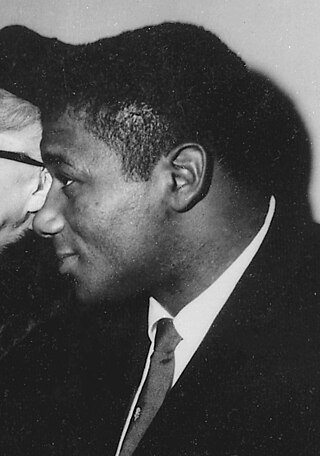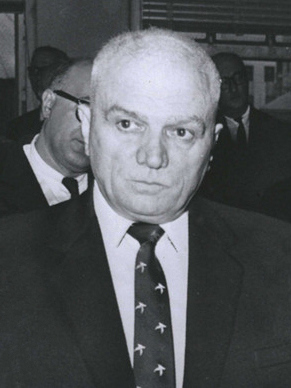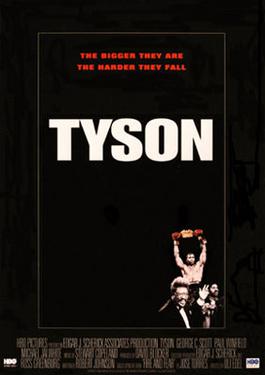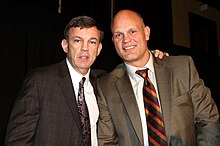
Michael Gerard Tyson is an American former professional boxer who competed from 1985 to 2005, with a post-retirement fight in 2024. Nicknamed "Iron Mike" and "Kid Dynamite" in his early career, and later known as "the Baddest Man on the Planet", Tyson is regarded as one of the greatest heavyweight boxers of all time. He reigned as the undisputed world heavyweight champion from 1987 to 1990. Tyson won his first 19 professional fights by knockout, 12 of them in the first round. Claiming his first belt at 20 years, 4 months, and 22 days old, Tyson holds the record as the youngest boxer ever to win a heavyweight title. He was the first heavyweight boxer to simultaneously hold the World Boxing Association (WBA), World Boxing Council (WBC), and International Boxing Federation (IBF) titles, as well as the only heavyweight to unify them in succession. The following year, Tyson became the lineal champion when he knocked out Michael Spinks in 91 seconds of the first round. In 1990, Tyson lost the undisputed heavyweight championship when he was knocked out by underdog Buster Douglas, making it one of the biggest upsets in boxing history.

José Louis "Chegüi" Torres was a Puerto Rican-born professional boxer who fought representing the United States. As an amateur boxer, he won a silver medal in the middleweight division at the 1956 Olympic Games in Melbourne. In 1965, he defeated Willie Pastrano to win the WBC, WBA, and lineal light-heavyweight championships. Torres trained with the legendary boxing trainer Cus D'Amato. In 1997, he was inducted into the International Boxing Hall of Fame.

Floyd Patterson was an American professional boxer who competed from 1952 to 1972, and twice reigned as the world heavyweight champion between 1956 and 1962. At the age of 21, he became the youngest boxer in history to win the title, and was also the first heavyweight to regain the title after losing it. As an amateur, he won a gold medal in the middleweight division at the 1952 Summer Olympics. He has been named among the top 15 heavyweights of all time.

Michael Lee Moorer is an American former professional boxer who competed from 1988 to 2008. He won a world championship on four occasions in two weight classes, having held the WBO light heavyweight title from 1988 to 1991; compiling 22 straight KOs in 22 fights and the WBO heavyweight title from 1992 to 1993; the unified WBA, IBF and lineal heavyweight titles in 1994; and regained the IBF heavyweight title again from 1996 to 1997 becoming a three-time heavyweight world champion.
Donny Lalonde is a retired professional boxer. His nickname is "Golden Boy," after the Golden Boy statue atop the Manitoba Legislative Building in his boxing home town of Winnipeg. Lalonde held the WBC Light Heavyweight Championship from 1987 to 1988.

Constantine "Cus" D'Amato was an American boxing manager and trainer who handled the careers of Mike Tyson, Floyd Patterson, and José Torres, all of whom went on to be inducted into the International Boxing Hall of Fame. Several successful boxing trainers, including Teddy Atlas and Kevin Rooney, were tutored by D'Amato. He was a proponent of the peek-a-boo style of boxing, in which the fighter holds his gloves close to his cheeks and pulls his arms tight against his torso, which was criticized by some because it was believed that an efficient attack could not be launched from using the technique.
William D'Arcy Cayton was a boxing promoter and manager. Clients included Mike Tyson, who sued him, yet retained him as manager when the two settled the lawsuit four years later, in 1988. Cayton also acted as a film historian and producer to preserve boxing's legacy. During his career, Cayton founded or co-founded several companies, including Cayton Sports, Inc., Reel Sports., Inc., Radio and Television Packagers, Inc. and Cayton, Inc.
Kevin Rooney is an American retired boxer and boxing trainer.
Peek-a-boo is a boxing style which received its common name for the defensive hand position, which are normally placed in front of the face, like in the baby's game of the same name. The technique is thought to offer extra protection to the face while making it easier to jab the opponent's face. The fighter holds their gloves close to their cheeks and pulls their arms tight against their torso. A major proponent of the style was trainer Cus D'Amato, who did not use the term peek-a-boo and instead referred to it as a "tight defense." The style was criticized by some because it was believed that an efficient attack could not be launched from it.

Oleksandr Oleksandrovych Usyk is a Ukrainian professional boxer. He has held the unified world heavyweight championship since 2021, and the Ring magazine title since 2022. He has held the undisputed championship in two weight classes—cruiserweight and heavyweight—and reigned as the undisputed world heavyweight champion from May to June 2024.

Tyson is a 1995 American biographical drama television film based on the life of American heavyweight boxer Iron Mike Tyson. Directed by Uli Edel and written by Robert Johnson, it stars Michael Jai White as Tyson alongside George C. Scott as Cus D'Amato and Paul Winfield as Don King. The film is an adaptation of the 1989 biography Fire and Fear: The Inside Story of Iron Mike Tyson by José Torres, a former boxer and former chairman of the New York State Athletic Commission, and depicts events from Tyson's troubled childhood in Brooklyn through his conviction in 1992 for the rape of beauty pageant contestant Desiree Washington.
Seamus McDonagh is a retired professional boxer who currently works as an actor, screenwriter and filmmaker.
James Leslie Jacobs was an American handball player, boxing manager, and comic book and fight film collector.

Mike Tyson vs. Michael Spinks, billed as Once and For All, was a professional boxing match which took place on June 27, 1988. Both fighters were undefeated and each had a claim to being the legitimate heavyweight champion. At the time, Tyson held the belts of all three of the major sanctioning organizations while Spinks was The Ring and Lineal champion. The fight was held at the Convention Hall, Atlantic City, New Jersey U.S., it was at the time the richest fight in boxing history, grossing some $70 million, of which Tyson earned a record purse of around $22 million and Spinks $13.5 million. Tyson won the fight, knocking out Spinks in 91 seconds.

Oleksandr Serhiyovych Gvozdyk is a Ukrainian professional boxer. He held the WBC and lineal light-heavyweight titles from 2018 to 2019. As an amateur, Gvozdyk won a bronze medal at the 2012 Olympics and a gold at the 2013 Summer Universiade.
Joseph Hadley is an American retired boxer from Jackson, Tennessee, who competed in middleweight division in the 1970s, one of a few trained by Cus D'Amato himself, and also one of the first documented U.S. mixed martial artists. He was selected a member of the All-American AAU boxing team for 1973, and was named the top middleweight amateur boxer in the nation in 1973 by the National AAU Boxing Committee. Hadley drew attention of the press and public by carrying a Bible into the ring, hence his nickname "Preacher," which reflects he actually was a minister. For that reason Hadley refused to pose for a picture with Muhammad Ali, "because Mr. Ali does not live tip to my principles according to the Bible."
"Irish" Bobby Stewart won the National Golden Gloves Tournament in 1974 as a light heavyweight. He also fought at the US-hosted undercard of The Rumble in the Jungle as a professional boxer, but he will be best remembered as the first trainer for Mike Tyson, who discovered Tyson's tremendous potential and introduced him to boxing in 1980.

Steve Lott was the CEO of Boxing Hall of Fame Las Vegas Nevada, boxing manager, former film editor at ESPN, and assistant to fight managers of the time Bill Cayton and Jim Jacobs, who financed Mike Tyson's boxing coach and life mentor Cus D'Amato, boxing film historian.

Non-compromised Pendulum is a book about the fight system of the boxing coach Cus D'Amato, known as a peek-a-boo. The book, written by the Ukrainian scientist and martial arts researcher Oleg Maltsev and D'Amato's mentee Tom Patti, was published in the English language in 2018, which can be accessed by anybody free of charge, to preserve the legacy of Cus Damato.

Michael Moorer vs. Vaughn Bean, billed as The March of Ides, was a professional boxing match contested on March 29, 1997, for the IBF heavyweight title.












